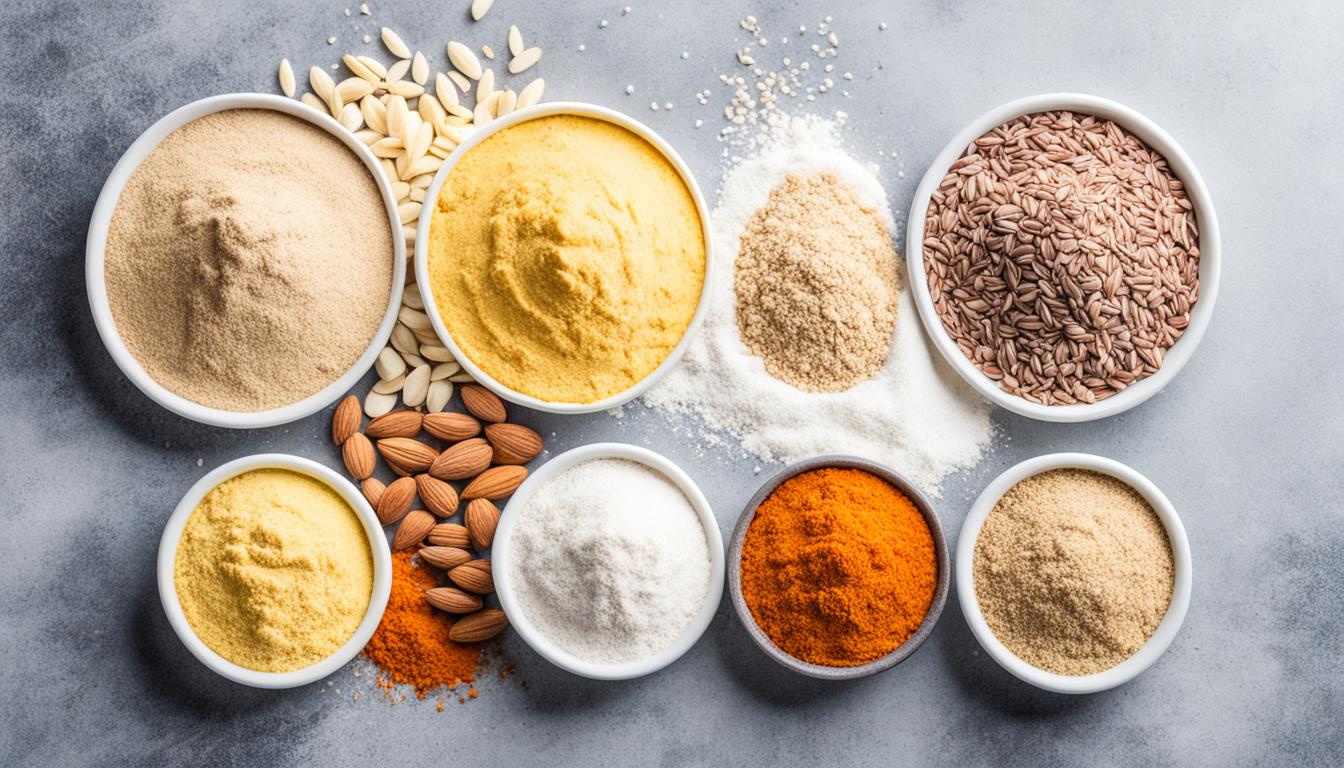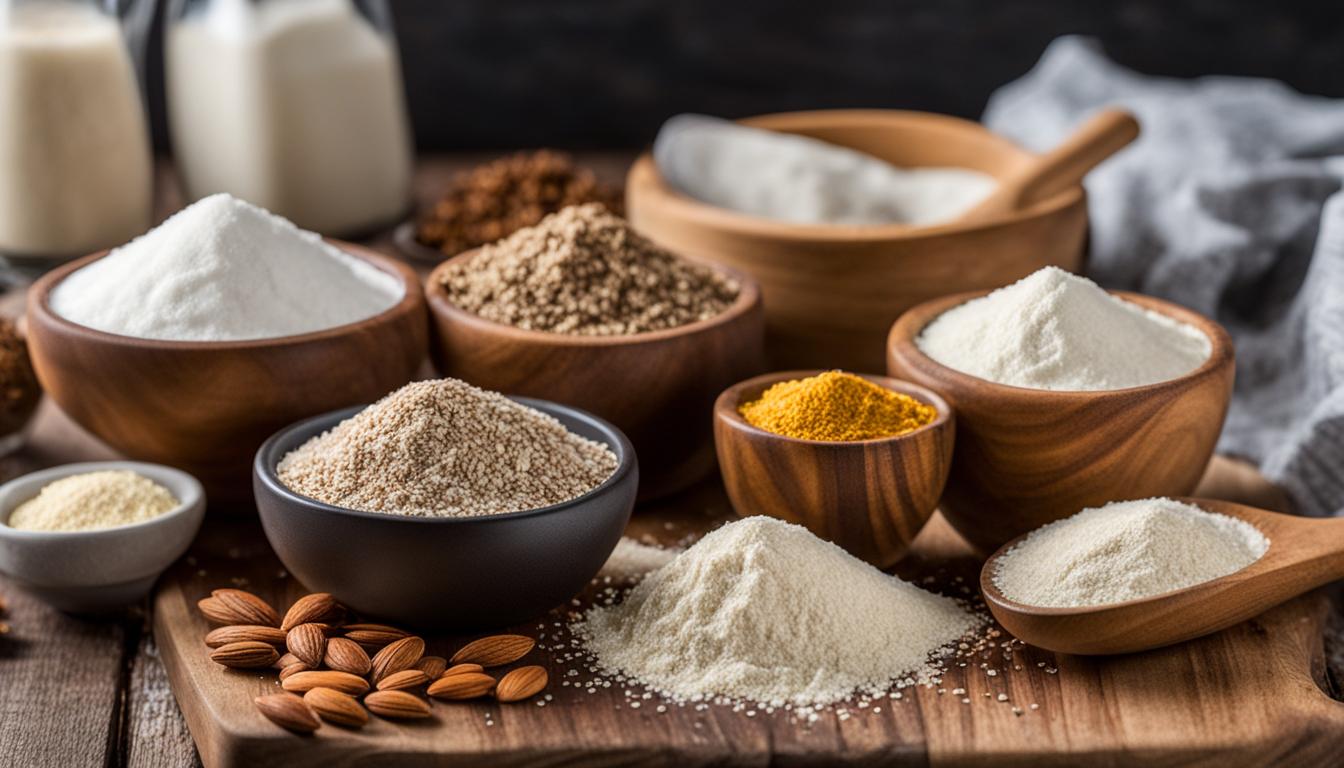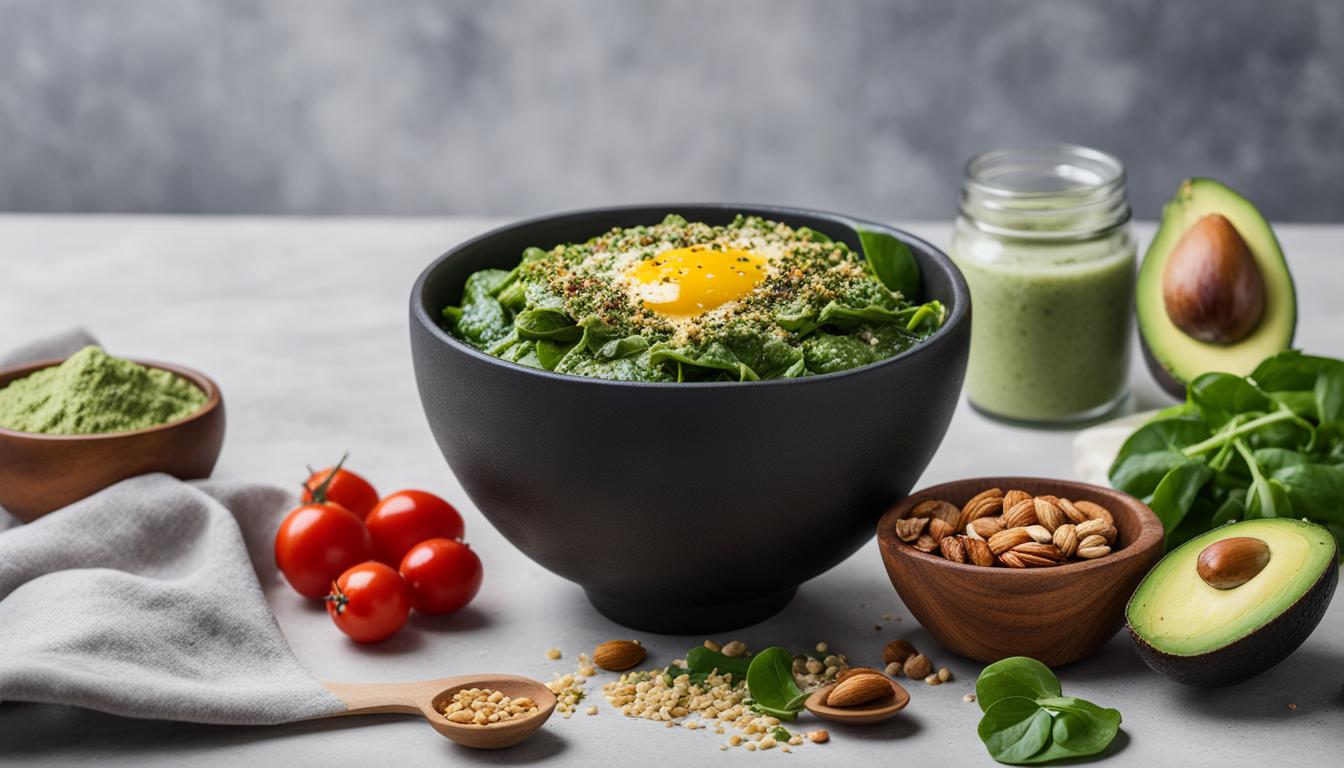Before determining if cassava flour is keto-friendly, it’s important to understand what cassava flour is and its nutritional composition. Cassava flour is derived from the cassava root and is known for its versatility in various recipes. However, it’s high in carbs and may not align with the low-carb requirements of a keto diet.
Cassava flour contains around 58 grams of carbs per 100-gram serving, which exceeds the recommended daily carb intake of 20-50 grams on a keto diet. Additionally, the carbs in cassava flour can have an impact on blood sugar levels, potentially disrupting ketosis.
For those following a keto diet, it’s advisable to opt for flours that are naturally low in carbs, such as almond flour or coconut flour. These alternatives provide a good balance of fats and proteins with minimal carbs, making them more suitable for a ketogenic lifestyle.
Key Takeaways:
- Cassava flour is not keto-friendly due to its high carbohydrate content.
- It contains around 58 grams of carbs per 100-gram serving, which exceeds the recommended daily carb intake on a keto diet.
- Opt for flours that are naturally low in carbs, such as almond flour or coconut flour, when following a keto diet.
- Almond flour and coconut flour provide a good balance of fats and proteins with minimal carbs, making them suitable for a ketogenic lifestyle.
- Consider incorporating cassava flour in a more liberal low-carb approach or a cyclical keto diet with portion control and pairing it with low-carb ingredients.
Keto-Friendly Standards for Flours
When it comes to choosing flours for a keto diet, it’s important to consider specific standards that align with the principles of low-carb, high-fat eating. Keto-friendly flours should meet criteria such as low carbohydrate content, adequate fiber, gluten-free status, versatility, nutrient density, natural ingredients, and a favorable glycemic index (GI). These factors contribute to the taste, texture, and overall compatibility with a ketogenic lifestyle.
Low Carbohydrate Content: The foundation of a keto diet is minimizing carbohydrate intake. Opt for flours that are naturally low in carbs to support ketosis, such as almond flour, coconut flour, and flaxseed meal. These alternatives provide a good balance of fats and proteins with minimal carbs.
Adequate Fiber: Fiber is essential for digestive health and can help maintain satiety on a keto diet. Choosing flours rich in fiber, like coconut flour, contributes to overall gut health and can aid in regulating blood sugar levels.
Gluten-Free: Many individuals on a keto diet prefer to avoid gluten due to sensitivities or dietary preferences. Almond flour and coconut flour are naturally gluten-free, making them suitable options for those following a keto lifestyle.
Versatility: Keto-friendly flours should be versatile and adaptable to various cooking and baking needs. Almond flour and coconut flour, for example, can be used in a wide range of dishes, including bread, pancakes, and sauces.
Nutrient Density: Choosing flours that provide additional vitamins and minerals is important. Almond flour, for instance, contains vitamin E, magnesium, and protein, making it a more nutrient-dense choice compared to refined flours.
Natural Ingredients: Look for flours that are made from natural ingredients and have undergone minimal processing. This ensures a higher quality product and supports a clean, whole-food approach to the keto diet.
Glycemic Index (GI): The GI measures how quickly a food raises blood sugar levels. Lower-GI flours, like almond flour and coconut flour, have a slower impact on blood sugar compared to traditional wheat flours, making them more suitable for a keto diet.
Taste and Texture: Enjoying the food is an essential aspect of any diet. Experimenting with different keto-friendly flours can help individuals find options that not only meet the nutritional criteria but also deliver the desired taste and texture in their favorite recipes.
By considering these keto-friendly standards, individuals can confidently choose flours that support their low-carb, high-fat lifestyle while still enjoying a variety of delicious and satisfying dishes.

+—+—————+——————+—————–+——————+——————-+—————-+————–+
| | Flours | Carbohydrate (g) | Fiber (g) | Net Carbs (g) | Healthy Fats (g) | Gluten-Free | GI |
+—+—————+——————+—————–+——————+——————-+—————-+————–+
| 1 | Almond Flour | 6 | 3 | 3 | 15 | Yes | Low |
| 2 | Coconut Flour | 6 | 6 | 0 | 8 | Yes | Low |
| 3 | Flaxseed Meal | 2 | 2 | 0 | 4.3 | Yes | Low |
+—+—————+——————+—————–+——————+——————-+—————-+————–+
Keto-Friendly Alternatives | Best Options
If you’re looking for low-carb alternatives to cassava flour on a keto diet, there are several keto-friendly options available. Here are some of the best alternatives:
Almond Flour
Almond flour is a popular choice for keto baking. It is low in carbs and high in healthy fats, making it a great substitute for cassava flour. You can use almond flour in a 1:1 ratio in many recipes, making it an easy swap.
Coconut Flour
Coconut flour is another excellent option for keto-friendly baking. It is low in carbs and high in fiber, giving your baked goods a slightly sweet taste. Coconut flour can be used as a substitute for cassava flour in various recipes, including pancakes, bread, and even as a breading for fried foods.
Flaxseed Meal
Flaxseed meal is a low-carb, high-fiber option that adds a unique flavor and texture to dishes. It can be a great replacement for cassava flour in certain recipes, like low-carb bread or muffins. Flaxseed meal is also rich in omega-3 fatty acids, making it a nutritious choice for your keto diet.
Psyllium Husk and Coconut Flour
If you’re looking for a keto-friendly alternative to tapioca flour, you can try a combination of psyllium husk and coconut flour. Psyllium husk provides chewiness, while coconut flour adds flavor and texture. This combination can help you achieve the desired consistency in your recipes without the need for cassava flour.
These keto-friendly alternatives offer low-carb options for your favorite recipes. Experiment with these substitutes to find the best fit for your taste preferences and dietary needs.

Navigating Keto with Cassava Flour
While incorporating cassava flour into a strict keto diet may not be ideal due to its high carb content, it can still be utilized in a more liberal low-carb approach or a cyclical keto diet. Incorporating cassava flour on a keto diet requires portion control to manage carb intake effectively. By limiting the amount of cassava flour used in recipes, individuals can ensure that the overall carb content stays within the desired range.
For those following a cyclical keto approach where carb intake is higher on certain days, integrating cassava flour can be a strategic choice. On these designated carb-up days, individuals can enjoy the flexibility of incorporating cassava flour into their meals while still maintaining ketosis during the rest of the week.
Pairing cassava flour with low-carb and fiber-rich ingredients is another way to navigate keto while enjoying the benefits of cassava flour. By incorporating ingredients such as almond flour, coconut flour, or flaxseed meal alongside cassava flour, individuals can balance the macronutrient profile of their dishes. This combination helps to offset the higher carb content of cassava flour and ensures the overall meal remains keto-friendly.
By incorporating cassava flour in moderation, controlling portions, and pairing it with low-carb ingredients, individuals can navigate keto while still enjoying the versatility of cassava flour in their culinary creations.
Conclusion
In conclusion, cassava flour is not suitable for a keto diet due to its high carbohydrate content. With approximately 58 grams of carbs per 100-gram serving, cassava flour exceeds the recommended daily carb intake on a keto diet, which is typically 20-50 grams. However, there are several keto-friendly alternatives to cassava flour that can be incorporated into a ketogenic lifestyle.
Almond flour, coconut flour, and flaxseed meal are great options for those following a keto diet. These flours are low in carbs and rich in healthy fats, making them more aligned with the principles of a ketogenic diet. They can be used as substitutes for cassava flour in various recipes, ranging from baking to cooking.
When selecting keto-friendly flours, it’s important to consider several factors. These include the carbohydrate content, healthy fat content, fiber content, gluten-free status, versatility, nutrient density, natural ingredients, allergen considerations, glycemic index, and taste and texture. By keeping these standards in mind, individuals can confidently choose flours that suit their keto lifestyle without compromising on flavor and variety.
In summary, while cassava flour is not suitable for a keto diet, there are many alternative flours available that can be used in its place. By being mindful of the various considerations when choosing keto-friendly flours, individuals can continue to enjoy a wide range of delicious dishes while adhering to their keto diet.
FAQ
Is cassava flour keto-friendly?
No, cassava flour is not considered keto-friendly due to its high carbohydrate content.
Can you eat cassava flour on a keto diet?
It is not recommended to consume cassava flour on a keto diet as it contains too many carbs.
What are some low-carb alternatives to cassava flour for keto?
Almond flour, coconut flour, and flaxseed meal are excellent options as substitutes for cassava flour on a keto diet.
Are there any standards for keto-friendly flours?
Yes, keto-friendly flours should have low carbohydrate content, moderate to high healthy fat content, adequate fiber, be gluten-free, versatile, nutrient-dense, made from natural ingredients, have a low glycemic index, and offer appealing taste and texture.
What are some keto-friendly substitutes for cassava flour?
Almond flour, coconut flour, and flaxseed meal can be used as alternatives to cassava flour for keto baking.
How can cassava flour be incorporated into a keto diet?
If you choose to use cassava flour on a keto diet, practicing portion control, considering a cyclical keto approach, and pairing it with low-carb ingredients can help manage its impact on carb intake.


